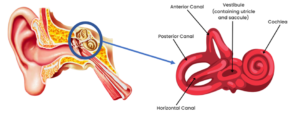Treatment for Dizziness at All Care Physiotherapy – Vestibular Neuritis
One of the causes of dizziness is Vestibular Neuritis, an inflammation of the Vestibular Nerve from a virus. Read on to find out how we helped Charlie, one of our clients, recover from this debilitating condition and return to a full life of activity symptom free.
Charlie was doing the dishes at home one evening after work. She had been feeling tired and slightly ‘off,’ but simply thought she was run down because of the long hours she had been working. Suddenly, Charlie felt a strong sensation of being off-balance and thought she better sit down. Then it quickly worsened to the point where the room started completely spinning! Charlie felt extremely nauseous and stumbled her way to the toilet where she vomited because of her dizziness.
Every time she moved, Charlie felt like the whole world was moving. She had no sense of where she was, felt like she was going to fall down and was extremely nauseous. After an hour, her symptoms did not settle so Charlie’s partner took her to the hospital where the doctors did some tests with her and took some scans of her head. This revealed nothing sinister, and Charlie was diagnosed with vestibular neuritis. She was advised to rest for a few days and then go and see a vestibular physiotherapist.
What is Vestibular Neuritis?
To understand what vestibular neuritis is, we need to know some more about the anatomy of your vestibular system.
Your vestibular system is located deep to your ear, inside your skull. Your vestibular system, along with your cochlea, make up your inner ear. You have one on each side of your head.
Your vestibular system is made up of:
- 3 semicircular canals (anterior, horizontal, posterior)
- 2 vestibular organs: your utricle and your saccule

Your inner ear is innervated by your vestibulocochlear nerve. It is made up of two parts:
- Vestibular Nerve (for your vestibular/balance system)
- Cochlear Nerve (for your hearing)
The vestibulocochlear nerve runs through a small bony canal in your skull and carries signals from your inner ear to your brainstem.
Vestibular neuritis is inflammation of the vestibular nerve. As the nerve runs through a small bony canal, when it is inflamed it can become squashed and damaged, which affects how well signals can get from your inner ear to your brain. In vestibular neuritis, your brain is getting distorted, incorrect or no information from the affected side’s inner ear! This makes you feel very dizzy, off-balance and nauseous.
What is the Treatment for Vestibular Neuritis?
Normally, there will be a period of about 3-5 days where you feel like the world is constantly spinning. Sometimes a doctor will prescribe anti-inflammatories and medication to help relieve your symptoms of vertigo and nausea. After 3-5 days, the severity of your symptoms should decrease.
Once the acute episode settles, it is very common to still feel off-balance and lightheaded. Your vestibular nerve can be damaged because of the inflammation, meaning that the signals back to your brain are still distorted, incorrect or completely absent. This is where vestibular physiotherapy comes into play!
At All Care Physiotherapy, we have vestibular physiotherapists who have specialist training in addressing symptoms that persist following a vestibular neuritis. Your All Care Vestibular Physiotherapist will complete a thorough assessment of how well your vestibular systems on each side are functioning. We do this with special Frenzel-recording goggles that record the movements of your eyes. This allows us to identify specific deficits in your vestibular systems and prescribe you with tailored vestibular rehabilitation exercises to retrain your brain to correctly interpret the distorted signals it is getting from your affected ear. Whilst vestibular rehabilitation involves a little bit of hard work, it is very effective at addressing residual symptoms of disequilibrium and lightheadedness following an attack of vestibular neuritis.
So What About Charlie?
Charlie came to All Care Physiotherapy a week after her symptoms started to settle down. She still felt lightheaded at times, particularly if she moved her head too quickly – it was almost like she was moving too fast for her brain to keep up! Charlie was prescribed a series of vestibular rehabilitation and balance exercises that increased in difficulty as she improved.
We helped Charlie over three months with a progressive vestibular rehabilitation programme. Charlie was back playing netball and riding her bike with no symptoms at all and very thankful for our treatment!
